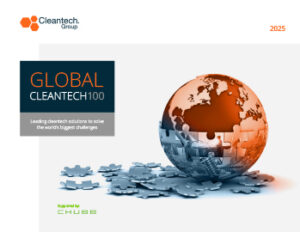A Toolkit to Accelerate Cleantech Ecosystem Development in Any Country
Cleantech start-ups face multiple challenges as they scale, including skills and organizational capacity, access to finance, and the need to compete with lower-priced, higher polluting incumbent technologies. Effective ecosystems support start-ups to overcome these challenges, creating the conditions to bring more cleantech innovation to market and to scale it faster. The result is economic growth as well as climate impact.
In partnership with UNIDO’s Global Cleantech Innovation Programme (GCIP), Cleantech Group has developed a set of high-level frameworks that provide countries with tools to strengthen their national cleantech ecosystems, identify synergies across those ecosystems, and foster opportunities to connect with each other for knowledge and partnership building.
The frameworks gather insights from over 85 innovators, investors, cluster leaders, policymakers and thought leaders from standout cleantech ecosystems ranging from Chile to Chennai, presenting best practices and ideas for different aspects of ecosystem building.
Finland uses five-year plans to send strong long-term policy signals to the private sector and wider innovation ecosystem. Finland’s plan outlines strategic priorities in terms of economic growth, sustainability and competitiveness.
The Policy Strategy Framework displays common strategies of countries that are successful in cleantech globally, as well as policies with demonstrated impact in increasing the participation of women and youth in cleantech entrepreneurship:
- The most effective policies and support mechanisms differ according to company lifecycle, so countries can get better results from limited resources by targeting policies according to the objectives
- Countries which need to boost early-stage innovation can deploy measures like grants, R&D support, setting long-term policy signals and ensuring a national body dedicated to innovation
- At the demonstration and commercialization stage, effective policy strategies include de-risking private sector investment, green public procurement, developing enabling infrastructure, and regulation which encourages adoption of innovation
- Increasing the participation of women and youth in cleantech entrepreneurship can lead to increased economic growth, increasing job creation, and surfacing innovation which anticipates market needs from diverse perspectives
India has established several funding schemes to increase women entrepreneurs’ access to capital. The state of Tamil Nadu has supplied over $16.2M in loans and $4M in subsidies to over 1,558 women entrepreneurs under the Prime Minister’s Employment Generation Programme (PMEGP).
Recently, Tamil Nadu Startup and Innovation Mission (StartupTN) announced the Tamil Nadu Startup Seed Grant Fund (TANSEED). The TANSEED scheme has resulted in a 50% increase in grant funding for special category start-ups, mandating 25% to women-founded and 10% to rural-based green technology ventures.
Successful clusters leverage feedback loops and network effects to boost the success of individual innovators, so that start-ups and SMEs within the cluster grow faster than the market average. The Cluster Development Framework shares best practices from standout cleantech clusters globally, including Valencia (Spain), Boston (U.S.) and Chennai (India).
At the municipal level, the mayors of Somerville, Boston, and Cambridge (U.S.) have focused on modernizing outdated infrastructure into hubs for cleantech innovation. Greentown Labs, a renowned cleantech ESO, repurposed a warehouse in Cambridge into its first site for emerging founders to share space and equipment to create prototypes.
- Because of the hardware-intensive, CAPEX heavy nature of most cleantech solutions, cleantech clusters must facilitate access to specialized talent, debt finance as well as risk capital, and markets which are ready to adopt new solutions
- Clusters may be driven by national priorities, or may arise within previously established general innovation clusters, or evolve out of incumbent industries which need to decarbonize
- In many standout clusters, a cluster facilitator has been critical to driving growth. At the local level, cluster facilitators may provide practical support for start-ups, facilitate market access and municipal level advocacy
- National governments can create the conditions for clusters to flourish across a country by ensuring skills, providing financial incentives, and putting in place a policy and regulatory framework which rewards innovative solutions and attracts companies, investments, and talent
The Swedish government identified an upcoming skills gap in cleantech-related professions. This led them to involve education institutions in workshops on decarbonizing industry.
The Ecosystem Actor Engagement Framework explains how the different actors in a cleantech innovation ecosystem work together to create value for the ecosystem. In emerging ecosystems, government and civil society play an important role in driving engagement.
Nigerian community organization SustyVibes uses pop culture to raise awareness of climate issues among young people, who make up 60% of Nigeria’s population. Events such as movie screenings and sustainability-themed parties bring young people together to discuss sustainability issues and solutions in a relaxed environment.
As ecosystems mature, typically other actors including VC investors, accelerator operators and even start-ups themselves will spontaneously organize events and activities which benefit the whole ecosystem. The framework gives a methodology for designing effective interventions, as well as examples of successful engagement activities run by diverse ecosystem actors from ecosystems around the world.
Tallinn-based start-up support organization Cleantech Estonia hosts a monthly podcast on Estonian national radio, featuring public sector officials and cleantech innovators. Topics and guests are chosen to link cleantech policy issues with real-world solutions. The podcast is aired on a business station and reaches a corporate audience such as CEOs and board members, a primary target group for the adoption of cleantech solutions.
Countries which are participating in the GCIP cover a diverse range of geographies, face different climate risks, and have different historical industrial strengths. This represents exciting potential as they work to develop thriving cleantech innovation ecosystems which build on their strengths and position new industries to satisfy cleantech global demand trends.
An additional framework, the Cleantech Innovation Capacity Building Framework, serves as the reference document for these activities. It should be read in conjunction with other ecosystem strengthening outputs of GCIP, including the Cleantech Innovation Policy Strategy Framework, the Cleantech Innovation Cluster Development Framework, and the Cleantech Ecosystem Actor Engagement Framework.



